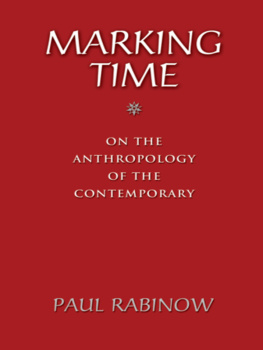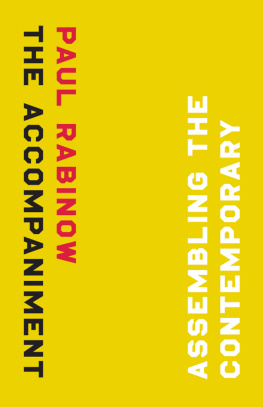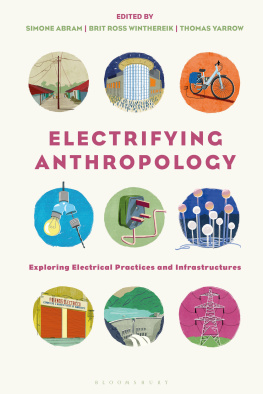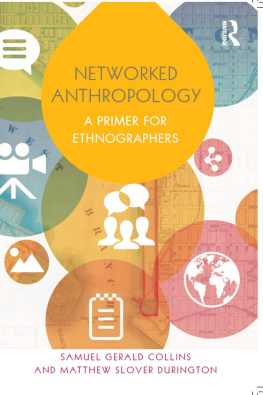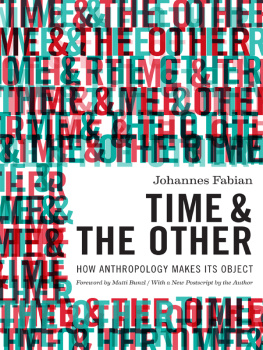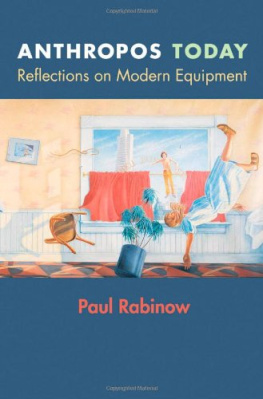MARKING TIME

MARKING TIME

ON THE ANTHROPOLOGY OF THE CONTEMPORARY
PAUL RABINOW

COPYRIGHT 2008 BY PRINCETON UNIVERSITY PRESS
PUBLISHED BY PRINCETON UNIVERSITY PRESS,
41 WILLIAM STREET, PRINCETON, NEW JERSEY 08540
IN THE UNITED KINGDOM: PRINCETON UNIVERSITY PRESS, 3 MARKET PLACE, WOODSTOCK, OXFORDSHIRE OX20 1SY
ALL RIGHTS RESERVED
LIBRARY OF CONGRESS CATALOGING-IN-PUBLICATION DATA
RABINOW, PAUL.
MARKING TIME : ON THE ANTHROPOLOGY OF THE CONTEMPORARY / PAUL RABINOW.
P. CM.
INCLUDES BIBLIOGRAPHICAL REFERENCES AND INDEX.
eISBN: 978-1-40082-799-2
1. ANTHROPOLOGYPHILOSOPHY. 2. CONTEMPORARY, THE. I. TITLE.
GN33.R26 2008
301.01DC22
2007008388
BRITISH LIBRARY CATALOGING-IN-PUBLICATION DATA IS AVAILABLE
THIS BOOK HAS BEEN COMPOSED IN ITC GALLIARD WITH TRAJAN DISPLAY
PRINTED ON ACID-FREE PAPER.
PRESS.PRINCETON.EDU
PRINTED IN THE UNITED STATES OF AMERICA
1 3 5 7 9 10 8 6 4 2
CONTENTS
Introduction
The Legitimacy of the Contemporary
Adjacency
Observation
Vehement Contemporaries
Vehement Contemporaries
Marking Time: Gerhard Richter
PREFACE
The phrase marking time is a term withseveral clusters of meaning surrounding it. Among these clusters three in particular are especially pertinent to the mode, tone, and project of this book. (1) The first grouping forms around pauses: a treading between goal-directed actions. This gathering of energy expended in one task and soon to be directed to another after a pause is of course itself an activity. And given the function of treadingcatching ones breath, keeping ones head above waterthe modality of this first sense of marking time is frequently a reflective one: where should I go next? And how should I get there? (2) A second semantic cluster forms around meanings that are more performative: for example, a keeping of time as a conductor or musician might be expected to do; or an ordering of temporal sequence that a historian might undertake; or the naming of temporal qualities a philosopher might wish to distinguish. Such timely ordering of things is often followed or accompanied by composing. (3) A third, at present largely virtual cluster, that of an anthropologist of the contemporary, attempts to take elements from the first two, gather them together, while adding an active practice of inquiry of a distinctive sort. Marking Time explores some of the dimensions of what that practice entails. This book continues work already accomplished in Anthropos Today: Reflections on Modern Equipment devoted to the formation of concepts useful for an anthropology of the contemporary.
The book is itself a punctual intervention marked, as it were, by a particular set of circumstances although its ambitions are of a more general kind. Marking Time took shape during a period of research and reflection in the years 20032006. There were three distinct, if interconnected, substantive areas of research that occupied and preoccupied me as well as those with whom I was working, thinking, and composing at the time. First and foremost was a continuing engagement with the changing terrain of biotechnology and postgenomics. An initial challenge was presented by an invitation to conduct anthropological research at Celera Diagnostics in 2003. It seemed to me that if anthropology was going to thrive in the twenty-first century, then it needed to modify its methods of inquiry and its modes of production. The temporality of both, but especially the leisurely, if stressful, duration of the latter, was such that given the pace of change of so many things going on in the contemporary worldfrom hip hop, to wars, to epidemics, to single nucleotide polymorphism mappingit would inevitably relegate the discipline to a historical one. Hence the challenge, and thus the exercise, was to conduct a solid research project and to write a book within a year. To do so, certain preliminary and atypical conditions had to be met: it was clear that access, technical familiarity, and a certain type of organization at a specific stage of its enterprise were preconditions. It was also clear that if such work was to succeed it would have to become more collaborative than was traditionally the case in anthropology. This meant not just the ethical collaboration with ones informants and explicit acknowledgment of their contributions, but a different mode of collaboration among the anthropological researchers. While the changes of collaboration in research and publication that had taken place in biology over the previous decades showed that such transformation of scholarly disciplines was possible, it was clear that direct imitation of that model would be misleading. What collaboration might look like in the qualitative human sciences would have to become itself a subject of experimentation. The first exercise designed to meet this challenge, the proof of principle as it were, yielded the book A Machineto Make a Future: Biotech Chronicles, co-authored with Talia Dan-Cohen, then an undergraduate at UC Berkeley.
The second project involved what turned out to be a rewarding, multifaceted, and changeable relationship with Roger Brent, director of the Molecular Sciences Institute (MSI), a National Genome Center of Excellence in Computational Biology located in the city of Berkeley (although independent of the uni-versity). I had originally intended to conduct research on the MSIs Alpha project, as a timely comparative counterpart and contrast case to that of Celera Diagnostics. Whereas the scientists and business people at Celera Diagnostics were confident in 2003 that the sequencing of the human genome (done in part by their parent company Celera Genomics) opened the door to immediate benefits in terms of identifying major markers for pathological conditions, the Alpha project was based on the premise that biology was not yet a full-fledged science since the field was neither quantitative nor predictive. The intellectually voracious and vivacious Brent and I engaged in many discussions, from which emerged a common agreement that I would not directly carry out research at MSI. Instead we concurred that our energies would be best spent elsewhere: Roger and I should develop a course together that would bring issues of genomics and citizenship into a common frame (we cotaught for three consecutive years from 2003 to 2005). Our free-wheeling and untrammeled discussions led to yet another unexpected swerve in my research interests. Brent convinced me that there was a real and growing danger of new biological threats, and that no even minimally protective bio-defense system existed in the United States (or elsewhere). His insistence on the pressing importance of the threat, and the connections to those working on the problem that he made available, led, with several more twists and turns, to an ongoing research project on the Global Bio-Politics of Security jointly undertaken with professors Stephen Collier and Andrew Lakoff..
The biosecurity interests led me to explore, and to become involved with, the emerging field of synthetic biology. Essentially an attempt to bring engineering standards into molecular biology and organic chemistry, the field broadens and accelerates exciting methods such as the engineered antimalaria molecule artemesinin, isolated from the bark of a Chinese tree, currently being produced in a synthetic form in yeast cells by Jay Keasling and his team at the new Center for Synthetic Biology at UC Berkeley and Lawrence Livermore National Laboratory. The technologies being refined and extended in this and other work, however, also open or advance the possibility of increased capacity and ease in the production of pathogenic agents, either naturally occurring ones, ones worked-over from existing pathogens, or entirely new ones. Beginning in 2006, these concerns and issuesthe nature of the objects being produced, the impact of security considerations on the already densely populated worlds of the life sciences, and the possible implications for our understanding of living beings formerly restricted to evolutionary timeconstitute the center of my current research.
Next page
